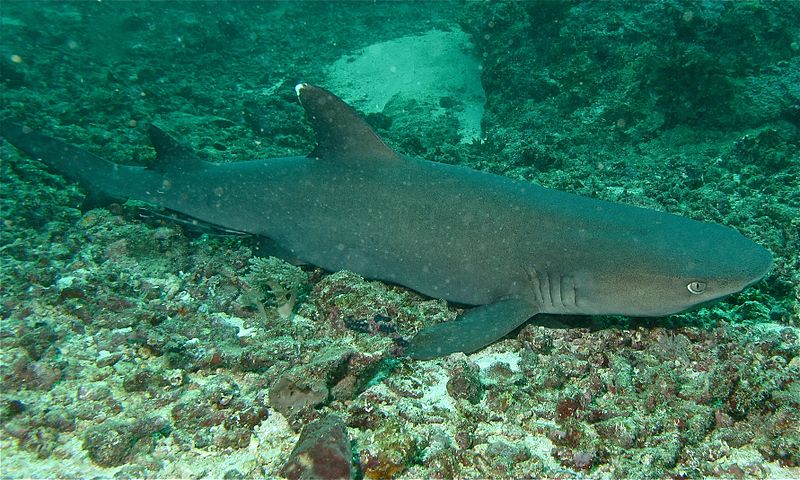
Whitetip Reef Shark off Sipadan in Sabah, Malaysia
On 22 July, the Swedish couple Roland Neander and Ewa Hansen was on a diving trip in the Ribbon Valley reef off the Semporna region in Sabah, Malaysia. After emerging from the waters, the two Swedish divers noticed something strange on a long boat passing by; it was filled up with dead sharks.
The Swedish couple quickly took a picture of the shark hunters, which they have shared with the Sabah Shark Protection Association (SSPA).
“I couldn’t believe it when we came up after the dive and saw the boat with the shark tails clearly hanging over the edge at noon,” Jonas Neander said to the Borneo Post.
The Swedish couple’s revelation comes just days before pictures of sharks being finned in the Semporna area were circulated on the internet causing global outcry.
“We had followed the online updates about the finning on Mabul – but to see it (dead sharks) with our own eyes was so disappointing, especially given the spectacular biodiversity of these waters which brings us back year after year,” Neander said.
Shark hunting is becoming an increasing problem in the Sabah region that, among other dive sites, hosts the Tunku Abdul Rahman Marine Park. Just before the Swedish couple’s picture was taken, the SSPA issued a press release adressing the problem.
“This kind of senseless shark slaughter is adding to the rapid decline of sharks while we are fighting to save them, and it sends a bad message to tourists diving Sabah. For the sake of the local marine ecology and economy, this has to stop.” said David McGuire, Director of the US based non profit group Shark Stewards and a member of the SSPA.
“There is a shark problem. The problem is too much killing and sales of shark fin,” McGuire added.
Local fishermen catch the sharks for their finns that is in high demand. However, the revenues from selling shark finns do not overshadow the profit generated by tourism coming to the region. According to a study by the Australian Institute of Marine Science (AIMS) from 2012, one reef shark in the Sabah region is, in its lifetime, worth over 3.3 million Malaysian Ringgit ($815,000 US) through ecotourism services. In contrast, shark finns are only worth about 440 Ringgit (100USD).
Despite such facts, shark hunting is a consistent problem in Sabah.
“Shark harvesting is still happening in Sabah, and Sabah desperately needs her sharks for tourism and environment. The clock is ticking for Sabah’s sharks and like any species decimation, there’s no rewind button to reverse the effects,” said Aderick Chong, Chairman of the SSPA in a separate press release.
The Sabah government have tried to adress the hunting by establishing a range of shark sanctuaries. However, without state-wide regulations from the Malaysian Federal Government in order to curb the harvesting of sharks and trade of their finns, the regional government’s efforts are inadequate.
Source:
The Borneo Post (28 July, 2016)

